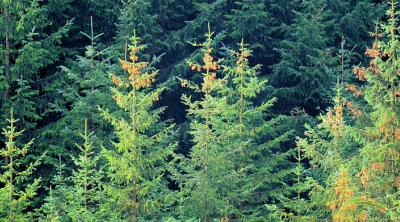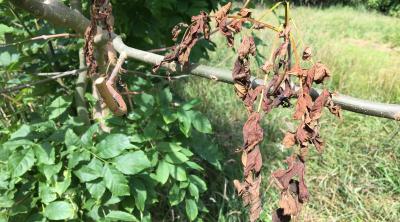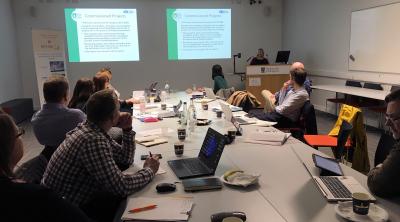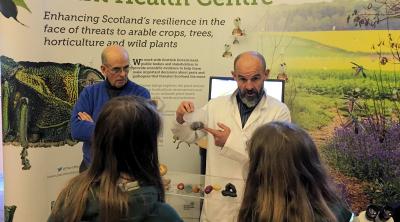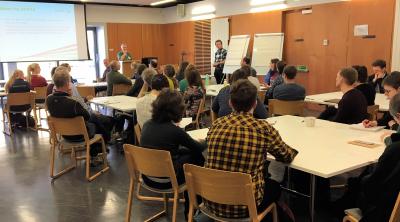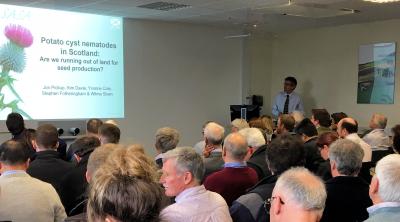News
The battle to save Scotland's forests from disease
Following another news item this week on the economic impacts of ash dieback, Scottish Forestry's John Douglas describes the battle to defeat another deadly tree disease Phytophthora Ramorum.
"When I first saw the impact this disease was having, it really almost reduced me to tears."
The words of Scottish Forestry's John Dougan as he describes the battle to defeat the deadly tree disease Phytophthora Ramorum.
It has spread throughout Scotland in recent years, leaving thousands of dead and damaged trees in its wake.
If the ongoing fight is lost, it is feared it could be catastrophic for the forestry industry and also hit tourism.
As the busy summer holidays period approaches, members of the public are being urged to take some simple precautions which could help, such as cleaning their boots before leaving.
"When I first saw the impact this disease was having, it really almost reduced me to tears."
The words of Scottish Forestry's John Dougan as he describes the battle to defeat the deadly tree disease Phytophthora Ramorum.
It has spread throughout Scotland in recent years, leaving thousands of dead and damaged trees in its wake.
If the ongoing fight is lost, it is feared it could be catastrophic for the forestry industry and also hit tourism.
As the busy summer holidays period approaches, members of the public are being urged to take some simple precautions which could help, such as cleaning their boots before leaving.
Ash dieback: Killer tree disease set to cost UK £15bn
The outbreak of ash dieback disease is set to cost the UK in the region of £15bn, it has been estimated. Scientists expressed shock at the "staggering" financial burden on taxpayers.
The authors warn that the cost of tackling the fallout from ash dieback far exceeds the income from importing nursery trees.
It was an imported nursery tree that initially brought the deadly disease to these shores. They added that it was the first time the total cost of the outbreak had been estimated.
The authors warn that the cost of tackling the fallout from ash dieback far exceeds the income from importing nursery trees.
It was an imported nursery tree that initially brought the deadly disease to these shores. They added that it was the first time the total cost of the outbreak had been estimated.
Plant imports and exports in a no deal Brexit
New information has been published for UK importers and exporters of plant material to and from the EU in the event of a no deal Brexit. This information includes fact sheets, a number of scenarios and questions answered.
Centres of Expertise meet in Glasgow
All four Centres of Expertise (CREW, EPIC, CxC and PHC), together with SEFARI Gateway, met at the School of Veterinary Medicine, University of Glasgow to continue discussions on ways to work more closely together and to ensure a joined up approach to stakeholder engagement and knowledge transfer.
Careers Fair for children in North East Fife
Thanks to the North Fife Rotary Club for inviting the Plant Health Centre to meet Primary 6 and 7 pupils from North East Fife to discuss careers in plant health and the disadvantages of bringing plants home from abroad (as part of the 'Don't Risk It' campaign).
UK Climate Predictions 2018 workshop
Dr Mike Rivington from the James Hutton Institute, through funding from Sefari Gateway, held a workshop with relevant stakeholders across the organisations delivering the Scottish Government research portfolio, including the Centres of Expertise, and wider research community, business, agencies and policy communities to discuss ways to collectively use the UKCP18 climate predictions data most effectively. The aim was to develop a longer-term network of collaboration for knowledge and experience sharing.
The workshop was a knowledge exchange and elicitation opportunity at which stakeholders could learn about the new projections, detail their experience with the UKCP09, and facilitate co-construction of networking and further knowledge sharing on using the UKCP18.
The workshop was a knowledge exchange and elicitation opportunity at which stakeholders could learn about the new projections, detail their experience with the UKCP09, and facilitate co-construction of networking and further knowledge sharing on using the UKCP18.
Eelworm threat to key Scots seed potato crops
Read the latest in the Scotsman from Dr John Pickup (SASA) on the threats from Potato Cyst Nematodes (eelworms) following his excellent presentation at the Scottish Society for Crop Research (SSCR) Potato Winter Meeting, March 7th 2019.
Cementing links between the Plant Health Centre and the UK Science Partnership for Animal and Plant Health
Chris Jacobs (secretariat for the UK Science Partnership for Animal and Plant Health) was given a tour of both RBGE and SASA and met leading plant health experts as part of a fact finding and networking visit to Scotland.
Ian Toth gives British Science Association lecture
Ian Toth gives the British Science Association lecture in Dundee 20th February 2019 entitled 'Reducing the burden of global pests and diseases' and introduces the Plant Health Centre and 'Don't Risk It' campaigns.
Growing the Future Report
'Growing the Future' is a report from the UK Plant Sciences Federation (UKPSF), a special advisory committee of the Royal Society of Biology.
Published in January 2019, the report highlights to policymakers and others the excellence of plant science in the UK, and its importance to the biosciences, the economy, and society both at home and around the world.
Plant Health and biosecurity (pages 8-9) is seen as an important priority, with the Plant Health Centre acknowledged as a key mechanism 'to facilitate the mobilisation of plant science expertise to effect coordination of research and response efforts to major disease outbreaks' (page 9).
Published in January 2019, the report highlights to policymakers and others the excellence of plant science in the UK, and its importance to the biosciences, the economy, and society both at home and around the world.
Plant Health and biosecurity (pages 8-9) is seen as an important priority, with the Plant Health Centre acknowledged as a key mechanism 'to facilitate the mobilisation of plant science expertise to effect coordination of research and response efforts to major disease outbreaks' (page 9).

